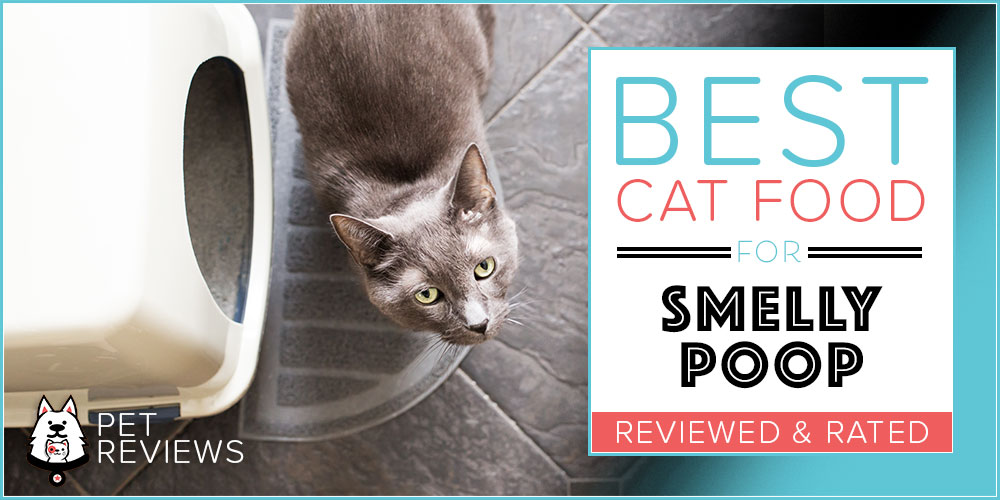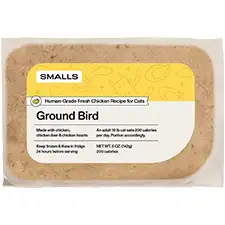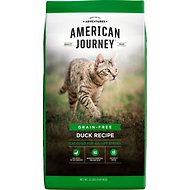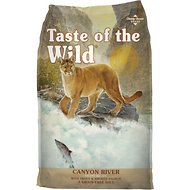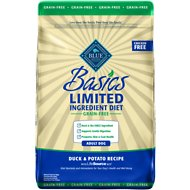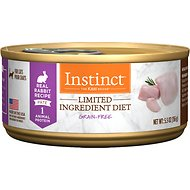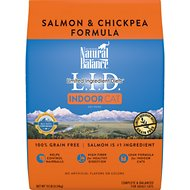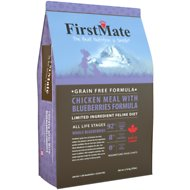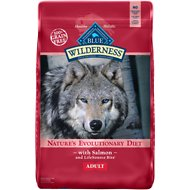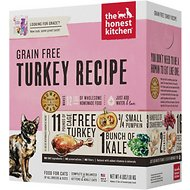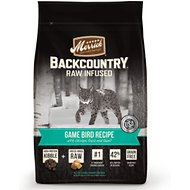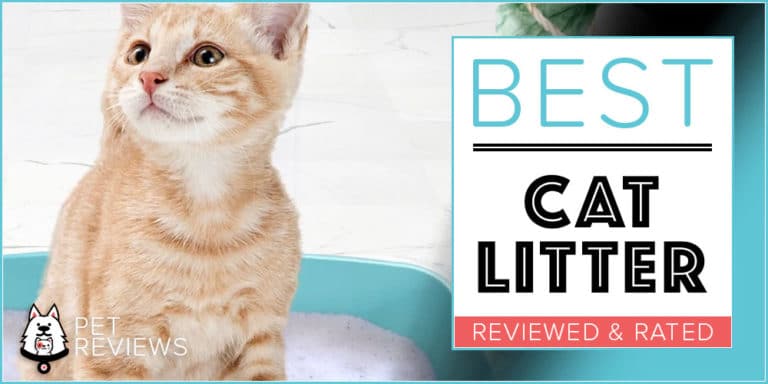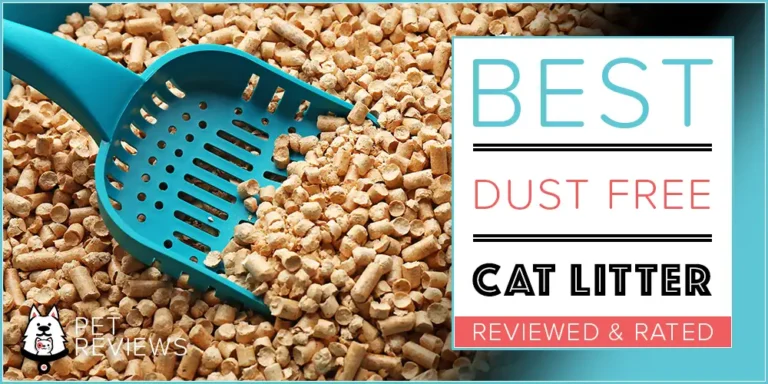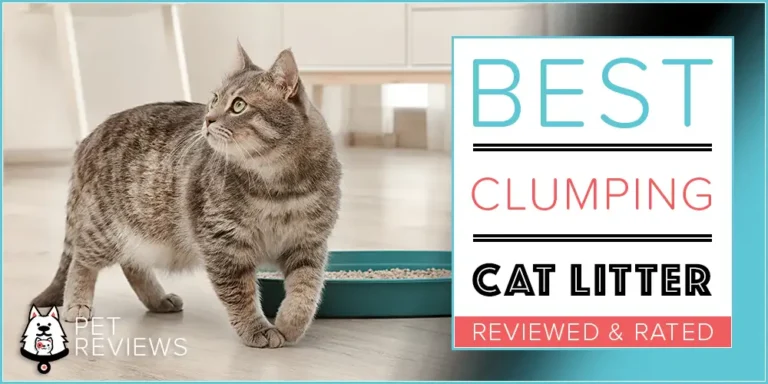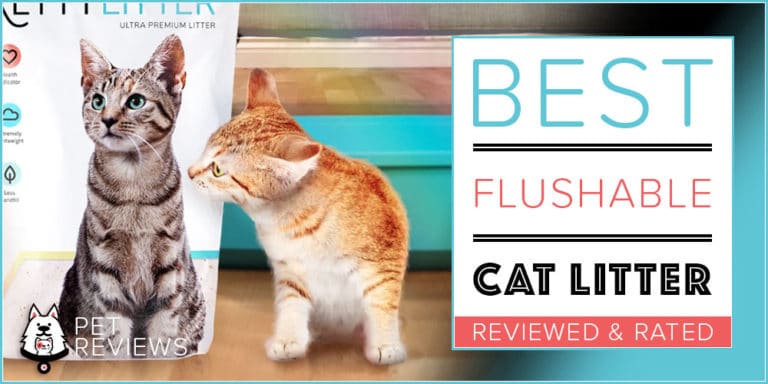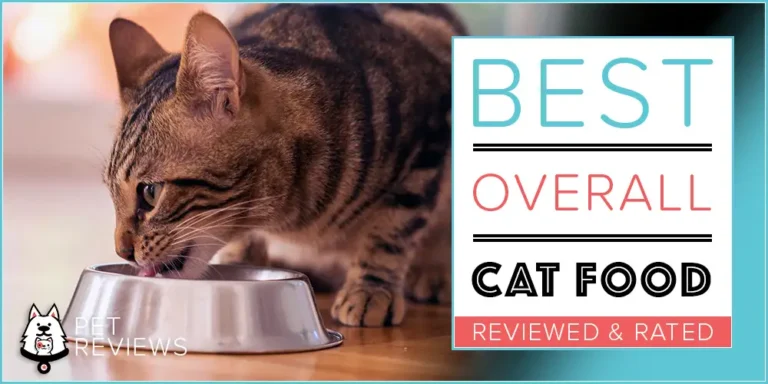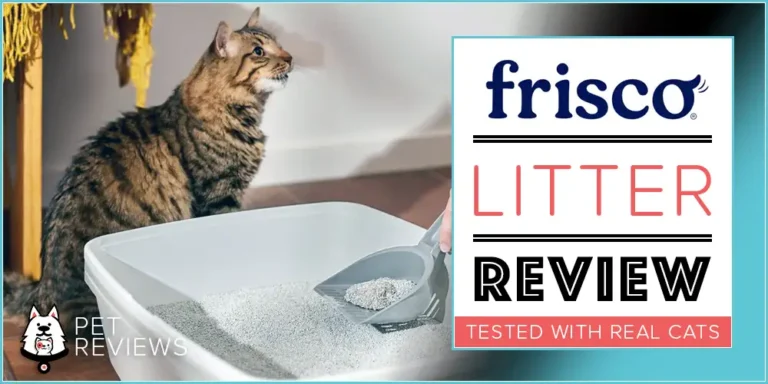11 Best Cat Foods for Smelly Poop (Low Odor Feces) in 2024
Quick Guide
- What is the Best Cat Food for Smelly Poop?
- What Causes Smelly Poop in Cats?
- 6 Tips for Dealing with Litter Box Odor
- What to Look for in a Cat Food for Smelly Poop
- The 10 Best Cat Foods for Smelly Poop
- Smalls Ground Bird Human Grade Cat Food
- American Journey Duck Recipe Grain-Free Dry Cat Food
- Taste of the Wild Canyon River Grain-Free Dry Cat Food
- Blue Buffalo Basics LID Grain-Free Duck & Potato Formula Dry Food
- Nature’s Variety Instinct Limited Ingredient Diet Grain-Free Rabbit Recipe Canned Food
- Natural Balance Salmon & Chickpea Formula LID Dry Cat Food
- 4 More Top-Rated Cat Foods for Low Odor Feces
- Frequently Asked Questions
Cat poop smells horrible – there is simply no way around it.
The great thing about cats is that they do their business in a litter box in the house. The bad thing about cats is that they do their business in a litter box in the house.
Not having to let your cat outside half a dozen times a day is a great convenience, but it also means that you’ll be stuck dealing with the unpleasantries of the litter box. Choosing the right cat litter and scooping the box regularly can help with odor control, but sometimes you may notice that your cat’s poop simply starts to smell more than usual.
What causes smelly poop in cats and what can you do about it? That’s exactly what we’re going to talk about here. In this article, you’ll learn the causes of smelly poop in cats and how to deal with litter box odor. You’ll also see our top picks for the best cat food to control feces odor.
What is the Best Cat Food for Smelly Poop?
- Smalls Ground Bird Fresh Cat Food Delivery – Healthiest
- American Journey Duck Recipe Grain-Free Dry Cat Food
- Taste of the Wild Canyon River Grain-Free Dry Cat Food
- Blue Buffalo Basics LID Grain-Free Duck & Potato Formula Dry Food
- Nature’s Variety Instinct Limited Ingredient Diet Grain-Free Rabbit
- Natural Balance Salmon & Chickpea Formula LID Dry Cat Food
- FirstMate Chicken Meal with Blueberries Limited Ingredient Grain-Free
- Blue Buffalo Wilderness Salmon Recipe Grain-Free Dry Food
- The Honest Kitchen Grain-Free Turkey Recipe Dehydrated Cat Food
- Merrick Backcountry Raw Infused Game Bird Recipe Grain-Free Dry Cat Food
What Causes Smelly Poop in Cats?
You can’t expect your cat’s stools to smell pleasant, if they start to take on a particularly strong or foul odor, it could be an indication of a problem. Many health problems in cats are accompanied by changes in stool including diarrhea and foul-smelling stools. So, the first thing you should do if your cat develops smelly stool is to consult your veterinarian.
Your veterinarian will want to know when your cat’s stool changed and whether he’s been experiencing any other symptoms. It may help to bring a stool sample along for testing – otherwise, you may need to take one after the visit and return to have it tested. With the sample, a history of your cat’s symptoms, and a physical exam, your vet should be able to identify the problem.
Here are some of the most common cause of smelly poop in cats:
- Bacterial Infection – Bacteria like E. coli and salmonella can cause infections which may lead to inflammation of the digestive tract and digestive symptoms like diarrhea and smelly poop.
- Intestinal Parasites – Several intestinal parasites like giardia, coccidia, and trichomonas are known for causing intestinal inflammation, gas, diarrhea, and odor.
- Digestive Disorders – Various digestive disorders that impact your cat’s ability to digest food and absorb nutrients may result in gas, diarrhea, or increased feces odor.
- Poor Diet – If your cat suddenly develops smelly poop, it could be an indication of a food allergy or sensitivity. It may also be that your cat is simply having a hard time digesting his food, which may be the case if you’re feeding him a low-quality or grain-based cat food.
Once your veterinarian diagnoses your cat’s issue, you can start talking about treatment options. In cases where there is no serious underlying problem, your cat’s smelly stools may resolve themselves within a few days. If the problem persists or if your cat develops bloody stools, vomiting, or low energy, it could be a sign of an emergency situation, and you should talk to your vet right away.
6 Tips for Dealing with Litter Box Odor
If you stick your head in the litter box and take a big whiff, you can’t expect it to smell very nice. But there is a difference between odor being contained to the litter box and odor pervading the entire house. Fortunately, there are some simple things you can do to control litter box odor.
Here are 6 simple tips for dealing with litter box odor:
- Switch to a covered litter box. If the issue is simply that litter box odor is spreading throughout the house, switching to a covered litter box might help keep it contained. You can find covered litter boxes that include a filter as well to help keep odor down.
- Try a new cat litter. Sometimes switching to a different type of cat litter can help reduce litter box odor. Look for a litter that absorbs well and forms hard clumps to seal in odor.
- Scoop the litter box more frequently. The more you scoop the litter box, the less there is to produce odor. It is best to scoop clumps every day or every other day and to refresh the entire litter box once every week or so, depending how many cats you have.
- Add another litter box. If you have more than one cat, adding an extra litter box may help to keep litter box odors from piling up as quickly.
- Use baking soda or a litter box deodorizer. Sometimes sprinkling baking soda or a litter box deodorizer over the litter in the box can help keep litter box odors down.
- Move the litter box to a new location. If you’re smelling the litter box on a daily basis, you may want to move it to a different location. Placing it in a well-ventilated area rather than the spare bathroom is a good idea. Plus, your cat will appreciate being able to breathe more easily.
In addition to trying some of the tips listed above, you may want to think about changing your cat’s diet. If your cat’s stool is very smelly, it may be an indication that he isn’t digesting his food properly and a change in diet might help. Keep reading to learn more.
What to Look for in a Cat Food for Smelly Poop
All cats have the same basic requirements when it comes to a balanced diet, but some cats digest food differently. Your cat is an obligate carnivore which means that he has a biological need for protein in his diet – his body was simply designed to digest and obtain nutrition from animal sources more effectively than from plant sources. If you’re feeding your cat a low-quality cat food or a product that doesn’t list an animal protein as the first ingredient, that could be the problem.
Even if you’re feeding your cat a high-quality cat food, he might be having trouble digesting one of the ingredients. Food allergies and sensitivities can happen in cats as well as people, so if your cat suddenly develops foul-smelling stool, you might take a look at his diet. To diagnose and treat food allergies, it’s a good idea to switch to a limited ingredient diet (LID) made with a lower number of primary ingredients to reduce the risk for triggering the allergy. It’s also a good idea to feed your cat a novel (new) protein source like duck, rabbit, or venison. After 12 weeks, if your cat’s symptoms have resolved, then you know it was his diet that was the problem.
In addition to identifying specific problems with your cat’s diet, there are some general things you should look for in a cat food to reduce litter box odor. Here are some things to look for in cat food for smelly poop:
- High-quality animal protein. Your cat requires a minimum of 26% protein in his diet, and it is best when it comes from animal sources like chicken, fish, and meat. A high-quality animal protein should be the first ingredient, and more protein is always better than less.
- Healthy animal-based fats. Fats provide a concentrated source of energy for cats as well as support for healthy skin and coat. They are best from animal sources like chicken fat and salmon oil, but plant-based fats can be used as supplemental sources.
- Digestible carbohydrates. When it comes to litter box odor, digestibility is key – if your cat has trouble digesting his food, his poop will smell more. Some cats are able to digest whole-grain carbohydrates, but you should still limit the amount of carbohydrate in your cat’s diet.
- Limited number of ingredients. The shorter the ingredients list, the lower the potential for triggering food allergies which can cause digestive symptoms like diarrhea and smelly poop.
- Rich in moisture and fiber. Increasing the moisture and fiber content of your cat’s diet will help boost his digestion which will hopefully reduce the odor in the litter box.
- No artificial additives. Artificial colors, flavors, and preservatives all have the potential to upset your cat’s stomach which can lead to digestive symptoms like smelly poop.
Now that you have a better understanding of what to look for in the best cat food to control feces odor, you’re ready to start shopping! If you’re still not sure where to look, try one of our top picks reviewed in the next section.
The 10 Best Cat Foods for Smelly Poop
If you’re wondering what causes foul smelling cat poop, there are many potential causes, but diet is often to blame. Switching your cat to one of the best cat foods for smelly poop that we’ve reviewed below may be the solution to your problem.
Smalls Ground Bird Human Grade Cat Food
When it comes to dealing with smelly cat poop, the best thing you can do is switch your cat to a high-quality, highly digestible diet. Most pet nutrition experts agree that, when it comes to quality nutrition, fresh is best. Fresh pet food is minimally processed, rich in moisture, and generally made with high-quality ingredients. Smalls is one of the top fresh pet food companies, and their recipes are loaded with animal protein, low in carbohydrates, and highly digestible. Choose from two recipes (chicken or fish) and receive monthly deliveries of fresh cat food perfectly portioned according to your cat’s age and weight. Within a few weeks, you should notice more regular digestion with smaller, less foul-smelling stools. You’ll also notice an improvement in the condition of your cat’s skin and coat.
- Pros: High-quality nutrition, packed with protein, rich in moisture, low in carbohydrates, highly digestible, more regular digestion, less foul-smelling stool, fresh fruits and vegetables
- Cons: Only two recipe options, fairly expensive to feed as a staple diet
American Journey Duck Recipe Grain-Free Dry Cat Food
Our Top Pick for the Best Affordable Cat Food for Smelly Poop: If fresh food isn’t in your budget, this American Journey Duck Recipe Grain-Free Cat Food may be a better option. Not only is it highly affordable, but it is made with high-quality ingredients including fresh duck as the primary source of protein. You’ll also find chicken meal, duck meal, and menhaden fish meal as supplemental sources of protein. Overall, this recipe provides 40% protein and 15% fat but is low in carbohydrates. Those carbohydrates come from digestible grain-free sources like tapioca, peas, and fresh fruits and veggies which are also natural sources for essential vitamins and minerals. This formula is rich in moisture for a dry food and contains plenty of fiber as well as dried fermentation products for probiotic support. You’ll also be glad to know that it contains chelated minerals for optimal nutrient absorption and is free from artificial additives and by-products.
- Pros: Affordable price, duck as main ingredient, digestible grain-free carbohydrates, fresh fruits and veggies, rich in protein and healthy fats, probiotics and fiber for digestion, chelated minerals
- Cons: Contains some plant protein (pea protein), some cats are sensitive to chicken ingredients
Taste of the Wild Canyon River Grain-Free Dry Cat Food
Our Top Pick for the Most Popular Cat Food for Stinky Poop: With so many different options to choose from, it can be tough to pick a single cat food. If you’re concerned about the quality of your cat’s diet but you simply don’t know what to pick, try a popular recipe like this Taste of the Wild Canyon River Grain-Free Dry Cat Food. This formula is protein-rich and low in carbohydrates, making it a good recipe for smelly poop. The first ingredient is fresh trout, following by ocean fish meal. You’ll also find supplemental sources of protein like smoked salmon to help your cat maintain lean muscle mass in addition to adding a boost of real meat flavor. This formula is rich in essential fatty acids for energy, particularly omega-3 fatty acids for healthy skin and coat. It contains fresh fruits and vegetables which act as natural sources for key nutrients as well as supplemental sources of fiber and probiotics for healthy digestion. All in all, this recipe is nutritionally balanced, rich in protein and fiber, and full of natural flavor with no artificial additives.
- Pros: Nutritionally balanced, easily digestible, rich in animal protein, plenty of healthy fats, probiotics, chelated minerals, fresh fruits and vegetables, no artificial additives
- Cons: Contains some plant proteins (pea and potato), could be higher in protein
Blue Buffalo Basics LID Grain-Free Duck & Potato Formula Dry Food
Our Top Pick for the Best Grain-Free Cat Food for Smelly Poop: If your cat has smelly stools, it may be a problem with his food. Many cats develop sensitivities to grains or other ingredients which can lead to litter box odor. This Blue Buffalo Basics LID Grain-Free Duck & Potato Formula Dry Food is a great option because, not only is it free from grains, but it is made with a limited number of main ingredients. Additionally, it is made with a novel source of protein and carbohydrate – duck and potato. This recipe is gentle on your cat’s stomach and easy to digest but still provides a balanced source of quality nutrition. It is packed with healthy fats for energy as well as skin and coat support, plus plenty of fiber to support your cat’s digestion. Overall, it provides 30% protein with 14% fat and a full 6% fiber. If you’re looking for a limited ingredient recipe that will help reduce your cat’s feces odor, try this or another Blue Buffalo Basics LID recipe.
- Pros: Limited number of ingredients, novel protein and carbohydrate, grain-free carbohydrates, rich in omega-3 fatty acids, probiotics and chelated minerals, fresh fruits and veggies
- Cons: Could be higher in protein (30%), contains some plant protein (pea protein)
Nature’s Variety Instinct Limited Ingredient Diet Grain-Free Rabbit Recipe Canned Food
Our Top Pick for the Best Wet Cat Food for Smelly Poop: When it comes to resolving smelly poop in cats, digestibility is key and wet cat food is often more digestible for cats. Wet cat food tends to be higher in protein and lower in carbohydrate ingredients than dry food, not to mention being much higher in moisture. This Nature’s Variety Instinct Limited Ingredient Diet Grain-Free Rabbit Recipe Canned Food is a great option because it is loaded with moisture and animal protein, and it is a limited ingredient recipe. This formula features real rabbit as the main ingredient and only source of protein. It also contains a single grain-free, digestible carbohydrate in the form of green peas. This recipe is supplemented to ensure nutritional balance but doesn’t contain any unnecessary ingredients. Overall, it is a protein-rich source of healthy nutrition that will optimize your cat’s digestion for less litter box odor.
- Pros: Single protein and carbohydrate, limited number of ingredients, rich in healthy fats, highly digestible, nutritionally balanced, chelated minerals, rich in fiber for digestion
- Cons: Contains some plant protein (pea protein), expensive to feed as a staple diet
Natural Balance Salmon & Chickpea Formula LID Dry Cat Food
Our Top Pick for the Best Cat Food for Sensitive Stomach and Smelly Poop: For cats with food allergies or sensitive stomach, limited ingredient diets are the way to go. These recipes contain a novel source of protein and carbohydrate (things your cat hasn’t had before) as well as a limited number of main ingredients to reduce the risk for triggering allergies and sensitivities. This Natural Balance Salmon & Chickpea Formula LID Dry Cat Food is a great option because it features fresh salmon as the main ingredient and a novel source of protein. This recipe contains digestible grain-free carbohydrates including chickpeas, peas, and potatoes which also provide healthy fiber to support your cat’s digestion. With fresh salmon and salmon meal on the list along with canola oil, you can rest easy knowing that this formula provides a balance of omega-3 and omega-6 fatty acids for healthy skin and coat, plus it contains chelated minerals for optimal nutrient absorption.
- Pros: Limited number of ingredients, novel protein and carbohydrate, salmon as first ingredient, blend of omega fatty acids, rich in fiber and moisture, chelated minerals, highly digestible
- Cons: May be too high in fiber for some cats, contains some plant protein (pea protein)
4 More Top-Rated Cat Foods for Low Odor Feces
If the six top-rated cat foods above don’t seem like the right fit for your cat, there are still plenty of other options. Here are four more choices in the best cat food for smelly poop:
FirstMate Chicken Meal with Blueberries Limited Ingredient Grain-Free Dry Food
If you’re looking for a highly digestible cat food that delivers a strong dose of protein, try this FirstMate Chicken Meal with Blueberries Limited Ingredient Grain-Free Dry Food. This limited ingredient recipe features 92% protein from animal ingredients, fresh chicken and chicken meal, with just 8% from vegetables. This formula is grain-free as well which helps with digestibility. The fact that FirstMate cat food is not made in the USA may make some cat owners uneasy, but it is manufactured in highly reputable facilities in Canada, so there is nothing to worry about. This formula features blueberries as one of the main ingredients which means that the recipe is rich in fiber as well as immune-supporting antioxidants. Overall, this formula provides 36% protein with 16% fat and 4% fiber.
- Pros: Chicken meal as main ingredient, novel carbohydrate (protein), antioxidant-rich blueberries, highly digestible, limited number of ingredients, chelated minerals, supplemental glucosamine
- Cons: Some cats may be sensitive to chicken ingredients, expensive to feed as a staple diet
Blue Buffalo Wilderness Salmon Recipe Grain-Free Dry Food
When it comes to digestibility and nutrition, the higher the protein content and lower the carb content, the better. This Blue Buffalo Wilderness Salmon Recipe Grain-Free Dry Food is designed to be protein-rich and grain-free for digestibility. It features fresh salmon as the first ingredient with supplemental protein from chicken meal and menhaden fish meal. This formula is grain-free, made with digestible carbohydrates such as tapioca and flaxseed, providing an overall fiber content of 4%. In this recipe, you’ll find several fresh fruits and vegetables which deliver supplemental fiber as well as a natural source of key vitamins and minerals. There are still supplements, however, to ensure nutritional balance, including chelated minerals for optimal nutrient absorption. You’ll also be glad to know that this recipe contains probiotic supplements for an extra boost to ensure healthy digestion.
- Pros: High-protein recipe, real salmon as first ingredient, grain-free carbohydrates, fresh fruits and vegetables, rich in omega fatty acids, chelated minerals, probiotics for healthy digestion
- Cons: Some cats are sensitive to chicken ingredients, contains some plant protein (pea protein)
The Honest Kitchen Grain-Free Turkey Recipe Dehydrated Cat Food
If fresh cat food isn’t in your budget, or if you’re looking for something a little more shelf-stable, dehydrated cat food is a good option to consider. Dehydrated cat food is dried to remove moisture which negates the need for artificial preservatives, but it doesn’t damage the nutritional integrity of the raw ingredients by exposing them to high heat. This The Honest Kitchen Grain-Free Turkey Recipe Dehydrated Cat Food is a great option to consider because it features fresh turkey and eggs as the top two ingredients and only sources of protein. It is grain-free, featuring pumpkin and potatoes as well as parsley, chard, and cranberries as the only other main ingredients. This formula is packed with protein and fiber with plenty of healthy fat for energy as well as skin and coat support. You’ll need to rehydrate it before feeding, but it delivers excellent nutritional quality.
- Pros: Dehydrated not cooked, high in protein, novel protein and carbohydrate, limited number of ingredients, fresh fruits and vegetables, high in moisture when rehydrated, chelated minerals
- Cons: Some cats dislike the texture of dehydrated food, expensive to feed as a staple diet
Merrick Backcountry Raw Infused Game Bird Recipe Grain-Free Dry Cat Food
When it comes to nutritional quality, nothing beats raw food but, unfortunately, raw food is very expensive. With this Merrick Backcountry Raw Infused Game Bird Recipe Grain-Free Dry Cat Food, your cat can experience some of the nutritional benefit of raw food without you having to worry about keeping it fresh or paying a high price. This dry food features high-protein kibble infused with freeze-dried bites of duck and quail to deliver a boost of flavor and nutritional quality. It contains 42% protein in a grain-free recipe that is highly digestible and completely free from artificial additives. You’ll find that this recipe is packed with omega fatty acids for healthy skin and coat as well as beneficial supplements to ensure nutritional balance. All in all, this recipe is a great choice to help reduce foul-smelling stools.
- Pros: High-protein kibble and freeze-dried raw bites, contains 42% protein, several premium animal proteins, digestible grain-free carbohydrates, rich in omega fatty acids, chelated minerals
- Cons: Some cats are sensitive to chicken ingredients, contains some plant protein (potato protein)
Frequently Asked Questions
- Why does cat feces smell so bad? – It is just a fact of life that cat poop smells horrible, but if your cat’s feces starts to smell more foul than usual, it may be an indication of a problem. Intestinal parasites, bacterial infection, and digestive disorders can all cause diarrhea, gas, and foul-smelling stools. Talk to your veterinarian and have a stool sample tested to make sure your cat isn’t sick.
- Does wet food make a cat’s poop smell? – It is not a matter of dry food versus wet food when it comes to foul-smelling feces but rather a matter of ingredients. Ingredients that are hard for cats to digest (like grains and fillers) are likely to cause smelly poop, regardless of it being dry food or wet food. Actually, wet food tends to be lower in carbohydrate ingredients than dry food on the whole, but low-quality wet food can be just as difficult for your cat to digest as low-quality dry food.
- What would cause my cat to have diarrhea? – Occasional diarrhea in cats can be caused by any number of things ranging from a change in diet to bacterial infection. Diarrhea is often a sign that your cat’s digestive system is upset and that can be caused by something he ate or something he was exposed to. Intestinal parasites, bacterial infections, and digestive disorders can all have diarrhea as a symptom, or it could simply be that your cat’s body is having trouble properly digesting something he ate.
- What gets rid of the smell of cat poop? – You can’t completely get rid of the smell of cat poop, but there are certain things you can do to make your cat’s stools smell less. Improving the quality and digestibility of his diet is key – if his body is able to digest the food and absorb the nutrients, there will be less waste, and his digestive system will be less irritated. If your cat is suffering from a bacterial or parasite infection, treating that issue is the best way to resolve litter box odor. If you’re not sure what’s cause your cat’s poop to smell, the best thing you can do is talk to your veterinarian.
The quality of your cat’s diet always matters, but if you’re trying to get rid of foul-smelling tools, it is even more important. The higher the quality of your cat’s food, the more digestible it will be. When your cat’s digestion is healthy, you won’t have to worry about issues with smelly poop.
The best cat food for smelly poop is loaded with premium animal proteins, rich in moisture and fiber, and highly digestible overall. If you’re not sure where to find a recipe like this, simply try one of the top-rated cat foods for smelly poop reviewed above. Good luck!

